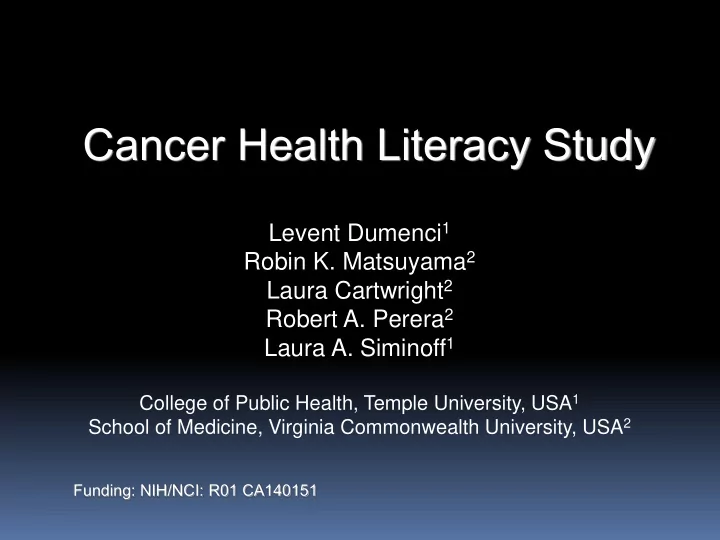

Cancer Health Literacy Study Levent Dumenci 1 Robin K. Matsuyama 2 Laura Cartwright 2 Robert A. Perera 2 Laura A. Siminoff 1 College of Public Health, Temple University, USA 1 School of Medicine, Virginia Commonwealth University, USA 2 Funding: NIH/NCI: R01 CA140151
Cancer Health Literacy Study OUTLINE • Introduce CHLT-30 and CHLT-6 • Why two tests • Test properties • Supporting evidence • Conclusion and future directions
Cancer Health Literacy Study Why Two Tests: CHLT-30: To measure cancer health literacy along a continuum. CHLT-6: To identify individuals with limited cancer health literacy
Cancer Health Literacy Study Health Literacy
Cancer Health Literacy Study 6% Health Literacy
Cancer Health Literacy Study 6% Health Literacy 76% Health Literacy
Cancer Health Literacy Study 6% Health Literacy 76% Health Literacy 1.6% Health Literacy
Cancer Health Literacy Study 6% Health Literacy 76% Health Literacy 1.6% Health Literacy 36% Health Literacy
Cancer Health Literacy Study CHLT-30: Test Development Process • Item writing: • Transcripts from • Delphi Panel discussions • Focus groups • Actual patient education materials • Recent advances in health literacy • Item selection: • 6 item writes 128 items • 76 items following cognitive interviews • 30 items using exploratory methods
CHLT-30 • Measures a unidimensional construct • 1-factor model / 2-PL IRT • N = 1,306 persons with cancer χ 2 df p RMSEA 90% CI CFI TLI 542.57 405 .001 .016 .010 - .019 .990 .989
CHLT-30 • Invariant measurement (i.e., no test bias) between • Blacks and Whites • Males and females • Persons with (N=1,306) and without (N=512) cancer Group Test Configural Scalar Difference Blacks vs Chi-Sq (df) 938.81 (810); 996.37 (838); 22.21 (28); White p<.005 p< .005 p=.095 Males vs Chi-Sq (df) 933.96 (810); 1004.05 (838); 62.52 (28); Females p<.005 p< .0001 p<.005 Cancer Chi-Sq (df) 1011.62 (810); 1041.64 (838); 37.44 (28); vs Non- p<.0001 p< .0001 p>.10 Cancer
CHLT-30 • Whites score higher than Blacks • Persons with cancer score higher than persons without • No mean difference between gender groups Group Mean p Males vs 23.97 – 24.26 = 0.247 Females Black vs 20.04 – 26.61 <0.001 Whites Cancer vs 24.13 – 21.58 <0.001 non-Cancer
CHLT-30 • The CHLT-30 scores are most informative of CHL of patients at the lower end of the distribution.
CHLT-30 • Test scores are highly reliable. Internal Consistency (N = 1,306) Cronbach’s Alpha McDonald’s Omega .88 .93 Test – Two – Week Six – Month Retest (N = 98) (N = 60) Mean: Time - 1 23.92 24.87 Mean: Time - 2 23.97 25.45 r .90 .92
CHLT-30 • Taking into account important covariates and general health literacy tests, the CHLT-30 is a strong predictor of self-confidence in engaging in health decisions. .66 .68 .88 Covariates: CHLT REALM STOFHLA Education Income Gender Ethnicity n.s. n.s. .41*** Age Health Decisions
CHLT-6 6 items selected from the 30 items containing the largest amount of • information about cancer health literacy Measures a binary construct • Latent class model – 2 classes • Limited CHL • Adequate CHL • N = 1,306 persons with cancer • Test χ 2 (df) p = Pearson’s χ 2 84.76 (50) 0.002 LRT χ 2 82.22 (50) 0.003
CHLT-6 Prevalence • Limited CHL (18%) Adequate CHL (82%) 1 0.9 0.8 0.7 0.6 Probability 0.5 0.4 0.3 0.2 0.1 0 1 2 3 4 5 6 Item Number
CHLT-6 • Classification are highly accurate. Limited Adequate Limited .950 .050 Adequate .037 .963
CHLT-6 • Invariant measurement (i.e., no test bias) between • Blacks and Whites • Males and females • Persons with and without cancer diagnosis Pearson’s Group p = LRT p = Entropy χ 2 ( df ) χ 2 ( df ) Blacks vs Whites 145.03 (100) 0.002 126.75 (100) 0.037 0.902 Males vs Females 122.97 (100) 0.059 123.11 (100) 0.058 0.915 Cancer vs No-Cancer 117.08 (100) 0.117 119.56 (100) 0.888 0.899 Blacks vs Whites 139.92 (112) 0.038 124.40 (112) 0.199 0.869 Males vs Females 104.75 (112) 0.674 125.03 (112) 0.189 0.875 Cancer vs No-Cancer 162.25 (112) 0.001 160.29 (112) 0.002 0.895
CHLT-6
Cancer Health Literacy Study TO-DO LIST Expending the scope: Test standardization and validation in non-cancer population Translational: Implementing in clinics and pharmacies Next grant: Developing research protocols to test predictors and health outcomes of change in cancer health literacy during treatment
Recommend
More recommend